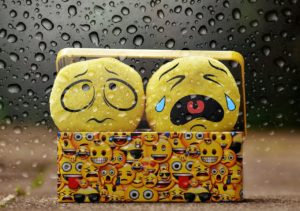Fascinating Reasons Why We Need Tears
We tend to think of tears when something makes us cry, whether we’re watching a touching or tragic movie or we’re laughing so hard that our eyes water.

However, tears are really the unsung heroes of eye health. They come in different types and there’s more to them than just water, so let’s take a closer look!
Tears Protect Our Eyes
All day, every day, our tears are protecting our eyes. The tear film is the barrier between the vulnerable surface of the eye and all kinds of germs, allergens, and irritants in the air. It is composed of three layers: a mucous layer that lies directly on the cornea, an aqueous layer that’s mostly made of saltwater, and an outer oily layer that keeps the other layers from evaporating.
These three layers work together to keep our eyes lubricated, clean, and free of harmful germs. With every blink, tears wash debris out of our eyes and help our vision stay clear and comfortable. That means that while we sleep, the gunk isn’t getting cleared out, which is why we have that grit in the corners of our eyes when we wake up.
Tear Production And Drainage
The tear film is constantly being refreshed so that it can do its job properly. Glands in our eyelids continuously produce new tears, and ducts in the inner corners of our eyes drain away excess tears down into our noses. So if you’ve ever wondered why crying makes your nose runny, now you know the answer!
Tears Help Us Feel Better
The tears in the aqueous layer of the tear film are basal tears, but when we cry, the tears come in two types: reflex tears and emotional tears. Like the tear film, these tears are good for us. Reflex tears are basically just an overflow of basal tears whenever our eyes need to flush something out, like when we get something in our eyes or when someone’s chopping onions in the same room.
Have you ever noticed that when you cry, even though the act of crying itself doesn’t change your situation, you still feel a little better afterwards? The reason for this is that emotional tears clear out some of the chemicals that build up due to stress. When we cry for emotional reasons, we’re purging harmful chemicals and triggering hormones to regulate pain, so make sure you’re indulging in a good cry every now and then!
Tears Versus Dry Eye
Dry eye happens when something goes wrong with normal tear production, and it leads to numerous problems and leaves the eyes very uncomfortable. It becomes more common with age and is often a side-effect of medication. If you’re experiencing dry eye, come see us so we can help you get those tears flowing like they should!
We get a little teary just thinking about how much we love our patients!
The content on this blog is not intended to be a substitute for professional medical advice, diagnosis, or treatment. Always seek the advice of qualified health providers with questions you may have regarding medical conditions.